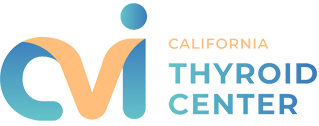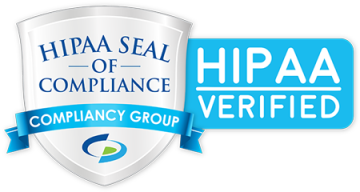Thyroid Cyst Ethanol Ablation (PEA)
The thyroid gland is a small butterfly-shaped gland located in the front of the neck. It is divided into two lobes, connected by a narrow strip of thyroid tissue known as the isthmus. Structurally, the thyroid gland is organized in small follicles that store the thyroid hormones.
Functionally, the thyroid gland is going to produce three hormones, triiodothyronine (T3), tetraiodothyronine (T4), and calcitonin. T3 and T4 play a crucial role in controlling our metabolism and they are also important for growth and brain development during childhood. On the other hand, calcitonin is involved in regulating calcium and bone metabolism.
Iodine is a vital component in thyroid hormone synthesis. Interestingly, we are not able to make this element, so we rely on our nutrition to get all the iodine we require in order to achieve normal thyroid function.
Thyroid Cysts
When thyroid nodules are filled with fluid, they are called “cystic” or “thyroid cysts.” About 15 to 25% of all thyroid nodules are thyroid cysts.3 If thyroid nodules are primarily filled with fluid and do not have a solid component, they are likely to be benign. However, if they are partially filled with fluid and have a solid part, the likelihood of them being cancerous increases.4 One such example of thyroid cancer that might present with cysts is the “papillary carcinoma.” These types of cystic nodules must be biopsies to make sure they are not cancer.
Thyroid cysts might result from the degeneration of the thyroid tissue or trauma. As with most thyroid nodules, thyroid cysts are discovered incidentally during routine physical examination or testing. Patients generally do not experience any symptoms but can later develop pain or other symptoms. This is more common if thyroid cysts result from hemorrhage or bleeding in the thyroid gland or are large. More severe and rapid cases of bleeding can result in complications like hoarseness, voice changes, or even difficulty breathing.
Request an appointment
Please note that although we strive to protect and secure our online communications, and use the security measures detailed in our Privacy Policy to protect your information, no data transmitted over the Internet can be guaranteed to be completely secure and no security measures are perfect or impenetrable. If you would like to transmit sensitive information to us, please contact us, without including the sensitive information, to arrange a more secure means of communication. By submitting this form you consent to receive text messages from CVI at the number provided. Msg & data rates may apply. Msg frequency varies. Unsubscribe at any time by replying STOP.
Thyroid Cyst Diagnosis
Thyroid cysts are usually discovered during routine physical examination. It is important to get thyroid cysts properly evaluated to exclude cancer. The following diagnostic tests are used for the evaluation and diagnosis of thyroid nodules and cysts:
- Serum TSH: TSH or thyroid stimulating hormone is produced by the pituitary gland in the brain. The hormone levels are low when the thyroid gland is overactive. In the majority of cases of cystic thyroid nodules, serum TSH levels are normal.
- Thyroid ultrasound: Thyroid ultrasound would be done if a thyroid lump or growth is discovered during physical examination. It helps to provide more information about the size, location, and characteristics of the lump. Thyroid cysts are usually diagnosed during an ultrasound in which they have a characteristic fluid-filled appearance. An ultrasound can also help to see if the nodule has any features suggestive of cancer.
- Fine-needle aspiration: The next step after a thyroid ultrasound scan is fine needle aspiration. This involves taking a small sample from the thyroid tissue and then later examining it under a microscope. It helps in the diagnosis of cancer. This test is not necessary if the thyroid cyst is entirely fluid-filled and has no solid component.
- Thyroid scintigraphy: It is also known as a thyroid scan. If patients have low levels of TSH, a thyroid scan is recommended before a biopsy. It helps to determine whether the thyroid nodule is “hot” or “” Hot nodules produce a lot of thyroid hormones and are mostly always harmless. Cold nodules are underactive and might represent cancer.5
Thyroid Cysts Treatment Options
There are several treatment options available for the management of thyroid cysts. For a small proportion of patients, fine-needle aspiration alone might be curative. Following are the main treatment options that are available to patients with thyroid cysts:
- Aspiration: About half of thyroid cysts are cured by simple aspiration. However, for most patients, fluid slowly starts to reaccumulate.6
- Surgical removal: Even though most thyroid cysts are not cancerous, some patients might prefer the surgical removal of thyroid cysts.
- Aspiration and chemical ablation (PEA): This treatment option involves the aspiration and injection of a sclerosing agent into the cystic space by using ultrasound.
- Radiofrequency ablation: This treatment procedure involves the aspiration and use of radiofrequency waves for the shrinkage of the solid and cystic skin of the nodule preventing any chance of recurrence.7
Thyroid Cyst Percutaneous Ethanol Ablation or Sclerotherapy (PEA): Procedure
Percutaneous ethanol ablation or sclerotherapy (PEA) is a non-surgical treatment option for the management of thyroid cysts. It is a minimally invasive non-surgical procedure that results in the shrinkage and destruction of the thyroid cyst. This procedure is performed by our double board certified vascular and interventional radiologist on an outpatient basis.
Before the procedure, the patient will be asked to lie down on a bed with the neck slightly extended, like an ultrasound study. The skin is cleaned, and area is numbed using a local anesthetic. During the procedure, our ultrasound trained doctor will use ultrasound imaging guidance to place a tiny needle into the cyst and perform aspiration, removing all the fluid from the thyroid cyst. This is crucial as if too much cystic fluid is left behind it will dilute the medication and make the ablation/sclerotherapy portion less effective. Once confirmed, the medication is slowly injected into the cyst. The medication dehydrates the cyst and causes mild inflammation to seal the skin of the cyst preventing recurrence. The needle is removed, and the procedure is concluded with the application of a Band-Aid. No antibiotics or painkillers are usually needed after the procedure.
Thyroid Cyst Percutaneous Ethanol Ablation (PEA): Results
Percutaneous sclerotherapy or ethanol ablation (PEA) is now recommended to be used as a first-line treatment option for primarily fluid-filled, non-cancerous thyroid cysts.8 Research has demonstrated excellent therapeutic results with percutaneous ethanol ablation.
PEA has resulted in about 85 to 98.5% reduction in the volume of non-cancerous thyroid cysts in previous studies.9 It also has a very low recurrence rate. However, ethanol ablation is less effective in cystic nodules with a predominant solid component. For patients with benign cystic nodules that have a solid component, radiofrequency ablation would be a better treatment option.8
Thyroid Cyst Percutaneous Ethanol Ablation (PEA): Recovery
Percutaneous chemical ablation is a very safe and effective method for the treatment of thyroid cysts. Patients are usually monitored for 30 minutes following the procedure and are subsequently allowed to return to their normal activity. An ice pack can be applied to the neck to help with the pain. Patients should avoid strenuous exercise and activity for the first couple of days after the procedure.10
Complications are extremely rare, but research has reported some patients to have experienced the following after chemical ablation:
- Local pain or discomfort
- Temporary hoarseness of voice
- Bruising
- Thyroid dysfunction
We will usually arrange a follow-up appointment in 4-6 weeks after the procedure. Most patients usually only require a one-time procedure, but our doctor will determine if you need any additional treatment.

We are Here to Help
Request an appointment to meet with our RFA specialist who will review your imaging, labs and history to determine if you are a good candidate for the procedure, and the outcomes you can expect. Each person is an individual and should discuss the potential risks and benefits of thyroid RFA with our doctor to decide if this is the best option.
Appointments are available via an online video telehealth platform or in person in Los Angeles, California. Why should you choose us? Read here.
Contact Us Today
Consultations are available via an online video telehealth platform or in person in Los Angeles, California. Why should you choose us? Read here.
1.) Brent GA. Mechanisms of thyroid hormone action. J Clin Invest [Internet]. 2012;122(9):3035– Available from: https://pubmed.ncbi.nlm.nih.gov/22945636/
2.) Pemayun TGD. Current diagnosis and management of thyroid nodules. Acta Med Indones [Internet]. 2016;48(3):247– Available from: https://pubmed.ncbi.nlm.nih.gov/27840362/
3.) Rojeski MT, Gharib H. Nodular thyroid disease. Evaluation and management. N Engl J Med [Internet]. 1985;313(7):428– Available from: https://pubmed.ncbi.nlm.nih.gov/3894966/
4.) Lee M-J, Kim E-K, Kwak JY, Kim MJ. Partially cystic thyroid nodules on ultrasound: probability of malignancy and sonographic differentiation. Thyroid [Internet]. 2009;19(4):341– Available from: https://pubmed.ncbi.nlm.nih.gov/19355824/
5.) Wong R, Farrell SG, Grossmann M. Thyroid nodules: diagnosis and management. Med J Aust [Internet]. 2018;209(2):92– Available from: https://pubmed.ncbi.nlm.nih.gov/29996756/
6.) Miller JM, Zafar SU, Karo JJ. The cystic thyroid nodule. Recognition and management: Recognition and management. Radiology [Internet]. 1974;110(2):257– Available from: https://pubmed.ncbi.nlm.nih.gov/4810134/
7.) Kim J-H, Baek JH, Lim HK, Ahn HS, Baek SM, Choi YJ, et al. 2017 thyroid radiofrequency ablation guideline: Korean society of thyroid radiology. Korean J Radiol [Internet]. 2018;19(4):632. Available from: https://pubmed.ncbi.nlm.nih.gov/29962870/
8.) Hahn SY, Shin JH, Na DG, Ha EJ, Ahn HS, Lim HK, et al. Ethanol ablation of the thyroid nodules: 2018 consensus statement by the Korean Society of Thyroid Radiology. Korean J Radiol [Internet]. 2019;20(4):609– Available from: https://pubmed.ncbi.nlm.nih.gov/30887743/
9.) Zingrillo M, Torlontano M, Chiarella R, Ghiggi MR, Nirchio V, Bisceglia M, et al. Percutaneous ethanol injection may be a definitive treatment for symptomatic thyroid cystic nodules not treatable by surgery: five-year follow-up study. Thyroid [Internet]. 1999;9(8):763– Available from: https://pubmed.ncbi.nlm.nih.gov/10482367/
10.) Mauri G, Bernardi S, Palermo A, Cesareo R, Italian Minimally-Invasive Treatments of the Thyroid group. Minimally-invasive treatments for benign thyroid nodules: recommendations for information to patients and referring physicians by the Italian Minimally-Invasive Treatments of the Thyroid group. Endocrine [Internet]. 2022;76(1):1–8. Available from: https://pubmed.ncbi.nlm.nih.gov/35290617/
The above information explains what is involved and the possible risks. It is not meant to be a substitute for informed discussion between you and your doctor, but can act as a starting point for such a discussion.









